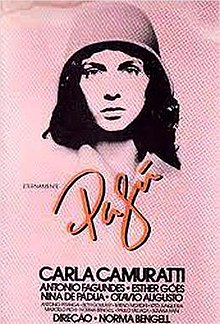Eternamente Pagú
| Eternamente Pagú | |
|---|---|
 Theatrical release poster | |
| Directed by | Norma Bengell |
| Written by | Norma Bengell Márcia de Almeida Geraldo Carneiro |
| Produced by | Jayme Del Cueto Agostinho Janequine |
| Starring | Carla Camurati |
| Cinematography | Antônio Luiz Mendes Soares |
| Edited by | Dominique Paris |
| Music by | Turibio Santos Roberto Gnattali |
Production companies | |
| Distributed by | Embrafilme |
Release date |
|
Running time | 100 minutes |
| Country | Brazil |
| Language | Portuguese |
Eternamente Pagú is a 1988 biopic about Patrícia Galvão, directed by Norma Bengell and starring Carla Camurati.[1]
Plot[edit]
Eternamente Pagú is a biographical film about Patrícia Galvão, best known as Pagu, a Brazilian political, literary and artistic activist. An important figure of the Brazilian Modernism, Pagu was also a militant for the Brazilian Communist Party after she married writer Oswald de Andrade. She broke up with Andrade and, as a journalist was arrested by the Dictatorship of Getúlio Vargas. After she left prison, she abandoned Communism in favor of Trotskyist Socialism, married Geraldo Ferraz, and started a career as theatre director.
Cast[edit]
- Carla Camurati as Patrícia "Pagu" Galvão
- Antônio Fagundes as Oswald de Andrade
- Esther Góes as Tarsila do Amaral
- Nina de Pádua as Sideria
- Otávio Augusto as Geraldo Ferraz
- Paulo Villaça as Pagu's father
- Norma Bengell as Elsie Houston
- Antonio Pitanga
- Breno Moroni
- Kito Junqueira
- Maria Sílvia
- Suzana Faini
- Beth Goulart
- Marcelo Picchi
- Carlos Gregório
- Eduardo Lago
- Ariel Coelho
Reception[edit]
At the 16th Festival de Gramado, it received the Best Actress Award (Camurati) and the Best Adapted Score Award.[2]
References[edit]
- ^ a b "Eternamente Pagú" (in Portuguese). Cinemateca Brasileira. Retrieved March 5, 2014.
- ^ "A Dama do Cine Shangai vence em Gramado". O Estado de S. Paulo (in Portuguese). Grupo Estado. June 28, 1998. Retrieved March 5, 2014.
External links[edit]
